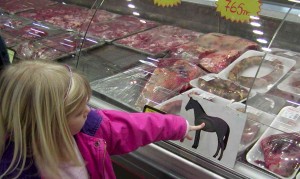The Food Safety Authority of Ireland (FSAI) has begun a fresh round of DNA testing of beef products as part of an EU-wide plan to prevent horse meat adulteration.
Some 50 samples of burgers, ready meals and other beef products will be checked for horse meat DNA and the results published soon after.
 The European Commission said it would publish all results from member states before the end of July.
The European Commission said it would publish all results from member states before the end of July.
Testing frenzy In January of last year the FSAI discovered horse meat in beef burgers manufactured here, sparking an EU-wide frenzy of testing which affected most of the continent.
The European Commission then directed EU member states to carry out more than 7,000 tests to detect the presence of equine DNA and veterinary drug phenylbutazone.
Overall, less than 5 per cent of the tested products contained horse DNA and Ireland was one of only five countries where no beef products tested positive for horse DNA. France found more cases of horse meat in beef products, followed by Greece.
About 0.5 per cent of the equine carcasses tested were found to be contaminated with phenylbutazone, or bute. This is an anti-inflammatory painkiller which can be dangerous to humans if ingested in large doses.
In the Irish tests, one sample out of 840 had traces of bute.
As well as conducting the EU tests for horse meat, the UK’s Food Standards Agency is also testing lamb dishes from takeaways following evidence that cheaper meats such as beef, chicken and turkey were being used in lamb dishes. Not lamb takeaway Its review of local authority sampling data, from July to December last year found that 43 out of 145 samples of lamb takeaway meals contained meat other than lamb.
